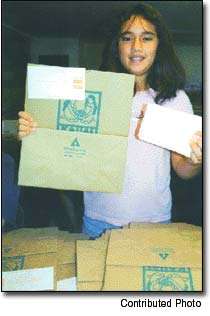NAWILIWILI — Agencies of the Kauai Food Bank are feeding more people now than they did immediately following the terrorist events of Sept. 11, 2001.
Around 9,500 people a month, or one in six Kauaians, received food this year from the Kauai Food Bank, according to Judith F. “Judy” Lenthall, executive director of the Kauai Food Bank. Lenthall said 8,500 people a month received food after Sept. 11, 2001.
In August of last year, food bank agencies provided food to some 6,460 Kauaians. Before Sept. 11, 2001, monthly averages were around 5,000 people fed, she said.
So while statistics indicate that the Kaua‘i economy is booming, with a low unemployment rate, lots of construction activity and high visitor-unit occupancy rates, another fact is that food bank agencies are feeding more people today than ever before, she said.
“It’s gotten worse. Our numbers have gone up.” Lenthall figures rising rents for housing, and rising gas prices, have stretched many family budgets to the limit.
Some senior citizens, who account for 25 percent of food bank recipients, are placed in the position of having to chose between buying food or prescription medications, she said.
Some adult heads of families face the grim reality of not having enough money to buy food and pay the rent, she observed.
Hard times come faster in today’s rapid-paced world, “and when it goes down (numbers of hungry Kauaians), it never goes down to previous lows,” she said.
“I’ve never seen it so volatile.”
She acknowledges that economic indicators show Kaua‘i survived the effects of Sept. 11, 2001 better than the other counties. But that’s “not the whole picture.
“Yes, things are good for some people, but in the last year things have gotten much worse for a bunch more people.” She calls her current statistics “frightening, frightening. Our people aren’t adapting. They’re suffering.”
The increase of nearly 50 percent in numbers of Kauaians being fed by food bank agencies (mostly through pantries set up at neighborhood churches) today compared to pre-Sept. 11 is distressing, she said.
“Is the economy good? Is unemployment down? Yes,” she said. “At the same time, the rising tide raises all ships, but we still have a lot of people falling off the boat.”
In keeping with historic trends, half of all those who get food from food bank agencies are children, she said.
At the same time, funds from state contracts have nearly evaporated, from an average of $27,000 a year from 2000 to 2002, to just $5,000 this year, she said.
A $25,000 grant from the G.N. Wilcox Foundation this year took up some of the slack, but as the food bank begins its annual holiday food and fund drive today, the goals remain $20,000 and 20,000 pounds of food.
The drive runs through Monday, Dec. 15, and in addition to the food bank warehouse near Nawiliwili Harbor, drop-off locations for both food and cash are county fire stations from Waimea to Princeville.
Each $1 donation allows food bank agencies to distribute $16 worth of food, because of various agreements with operators of other food banks and food distributors to purchase surplus and bulk food.
“We have so much to be thankful for,” she said of the healthy overall Kaua‘i economy. “At the same time, there are greater needs for food,” said Lenthall.
Very few people, mostly seniors living at or below the poverty line, get food from food bank agencies on a regular basis. Most receive food only on a “sporadic, as-needed basis,” she said.
Recent statistics show that 11.6 percent of the state’s population, which would equate to just over 6,700 Kauaians, are living in poverty.
Yet 9,500 people on Kaua‘i were fed by food bank agencies each month this year, and a 2001 study conducted by the University of Hawai‘i concluded that 20 percent of the island’s population, or over 11,600 people, were “food-insecure.”
Associate Editor Paul C. Curtis can be reached at pcurtis@pulitzer.net or 245-3681 (ext. 224).





